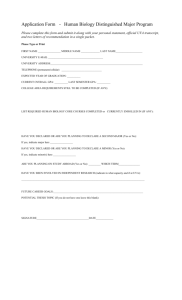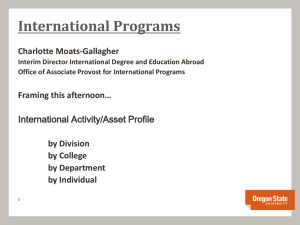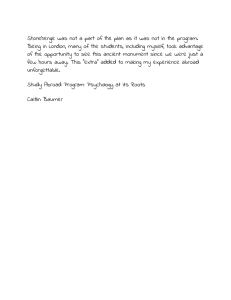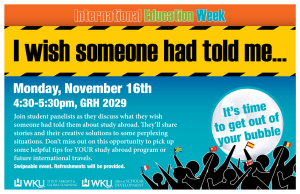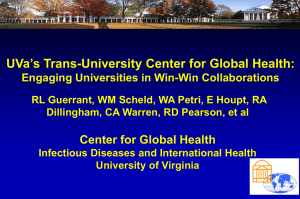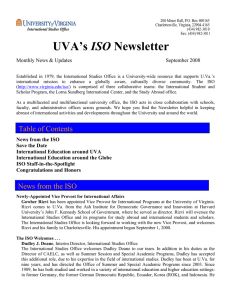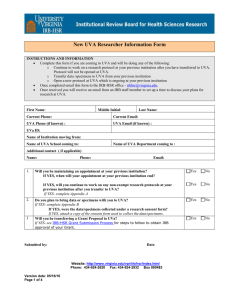International Activities Commission Executive Summary Summer 2000
advertisement
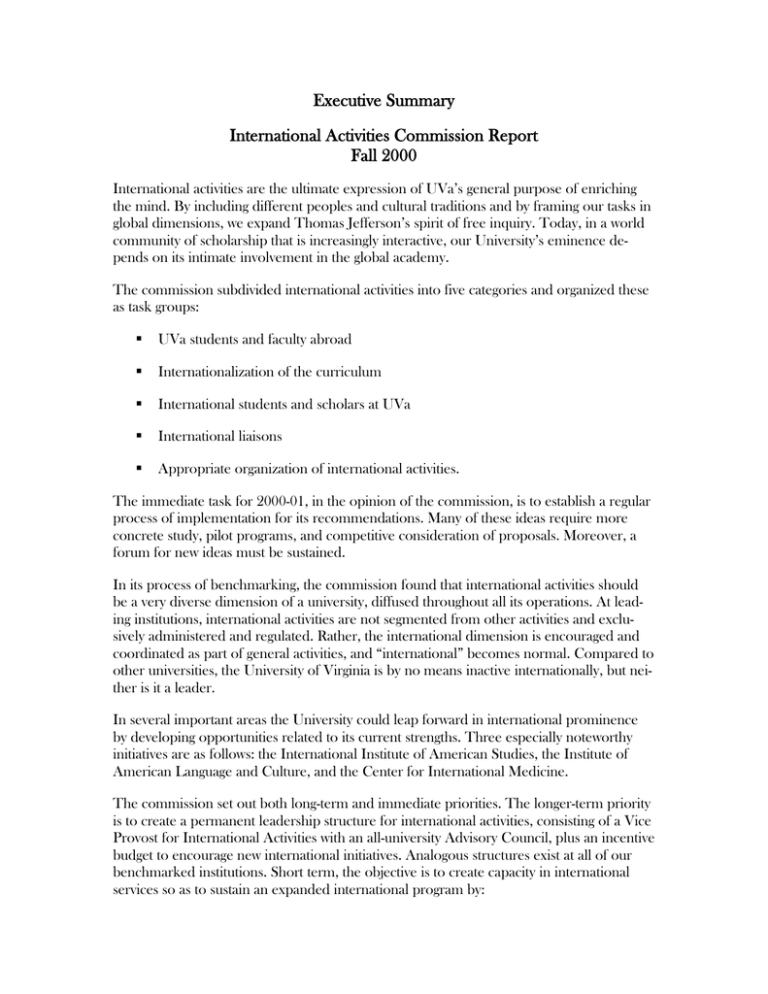
Executive Summary International Activities Commission Report Fall 2000 International activities are the ultimate expression of UVa’s general purpose of enriching the mind. By including different peoples and cultural traditions and by framing our tasks in global dimensions, we expand Thomas Jefferson’s spirit of free inquiry. Today, in a world community of scholarship that is increasingly interactive, our University’s eminence depends on its intimate involvement in the global academy. The commission subdivided international activities into five categories and organized these as task groups: UVa students and faculty abroad Internationalization of the curriculum International students and scholars at UVa International liaisons Appropriate organization of international activities. The immediate task for 2000-01, in the opinion of the commission, is to establish a regular process of implementation for its recommendations. Many of these ideas require more concrete study, pilot programs, and competitive consideration of proposals. Moreover, a forum for new ideas must be sustained. In its process of benchmarking, the commission found that international activities should be a very diverse dimension of a university, diffused throughout all its operations. At leading institutions, international activities are not segmented from other activities and exclusively administered and regulated. Rather, the international dimension is encouraged and coordinated as part of general activities, and “international” becomes normal. Compared to other universities, the University of Virginia is by no means inactive internationally, but neither is it a leader. In several important areas the University could leap forward in international prominence by developing opportunities related to its current strengths. Three especially noteworthy initiatives are as follows: the International Institute of American Studies, the Institute of American Language and Culture, and the Center for International Medicine. The commission set out both long-term and immediate priorities. The longer-term priority is to create a permanent leadership structure for international activities, consisting of a Vice Provost for International Activities with an all-university Advisory Council, plus an incentive budget to encourage new international initiatives. Analogous structures exist at all of our benchmarked institutions. Short term, the objective is to create capacity in international services so as to sustain an expanded international program by: Expanding and reconfiguring study abroad, to include: advising, program development, marketing, management, and quality control. A fiscal reconfiguration of study abroad could make its services self-supporting. Providing adequate visa and other services for international students and scholars. Attending to the housing problems of international scholars, including remote access to information and reservations and availability of short-term housing. Adding physical space and improving the profile of the International Studies Office. In summary form, recommendations of the task groups are as follows: Have 80 percent of undergraduates involved in study abroad by 2020; develop fifthyear abroad programs that integrate international experience with disciplinary training and career objectives. Develop adequate faculty resources, flexible language programming and use of new technology; integrate international aspects of academic life with the rest of university people and activities; implement pilot programs that go beyond the boundaries of normal language work. Transform the International Studies Office into the central and visible symbol of UVa’s commitment to international studies; develop an Institute of American Language and Culture to focus on advanced professional fluency in language and culture; begin planning an International Summer Institute in American Studies. Begin systematic worldwide development of institutional relationships; create an International Institute of American Studies; formalize procedures and standards for international liaisons. Create position of Vice Provost for International Activities, an Advisory Council on International Activities, and an incentive budget for encouraging and coordinating international activities; develop an all-university integrated approach to international activities; the Interim Vice-Provost for International Activities should lead an International Activities Committee. At present, the University is engaged in a heartening number of international activities, all of which contribute to a sense of dynamism and optimism about its future as a center of global excellence. The report offers many concrete suggestions for capitalizing on this momentum. 2
